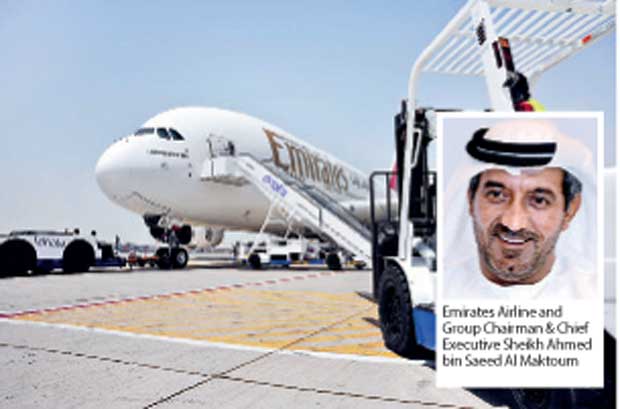13 Nov 2017 - {{hitsCtrl.values.hits}}

The Emirates group has announced its half-year results for 2017-18. The group saw steady revenue growth and a rebound on profitability compared to the same period last year, in spite of the continuing downward pressure on margins, a rise in oil prices and other challenges for the airline and
travel industry.
The Emirates group revenue was AED 49.4 billion (US $ 13.5 billion) for the first six months of its 2017-18 financial year, up 6 percent from AED 46.5 billion (US $ 12.7 billion) during the same period last year.
Profitability rebounded after a low during the same period last year, with the group reporting a 2017-18 half-year net profit of AED 2.3 billion (US $ 631 million), up 77 percent. This result was driven by capacity optimisation and efficiency initiatives across the company, steady business growth and a more favourable foreign exchange situation compared to the same period last year.
The group’s cash position on September 30, 2017 was at AED 18.9 billion (US $ 5.2 billion), compared to AED 19.1 billion (US $ 5.2 billion) as at March 31, 2017.
Emirates Airline and Group Chairman and Chief Executive Sheikh Ahmed bin Saeed Al Maktoum said, “A lot of the credit for our 2017-18 half-year results goes to our talented workforce who have worked hard to improve our business performance and address our challenges without compromising on quality and service.
“Our margins continue to face strong downward pressure from increased competition, oil prices have risen and we still face weak economic and uncertain political realities in many parts of the world. Yet, the group has improved revenue and profit performance. This speaks to the resilience of our business model and the agility of our people.
The easing of the strong US dollar against other major currencies helped our profitability. We are also seeing the benefit from various initiatives across the company to enhance our capability and efficiency with new technologies and new ways of working. Moving forward, we will continue to keep a careful eye on costs while investing to grow our business and provide our customers with world-class products and services.” In the past six months, the group’s employee base reduced by 3 percent compared to March 31, 2017, from an overall staff count of 105,746 to 102,669. This was largely a result of natural attrition together with a slower pace of recruitment, as various parts of the business adopted new technologies, streamlined business processes and re-allocated resources.
Emirates
Emirates continues to invest in the most advanced wide-body aircraft to improve overall efficiency and provide better customer experience. During the first six months of 2017-18, Emirates received 10 wide-body aircraft – four Airbus A380s and six Boeing 777s, with nine more new aircraft scheduled to be delivered before the end of the financial year. It also retired five older aircraft from its fleet with further four to be returned by March 31, 2018.
In the first half of the 2017-18 financial year, Emirates net profit is AED 1.7 billion (US $ 452 million), up 111 percent, compared to last year. Emirates revenue, including other operating income, of AED 44.5 billion (US $ 12.1 billion) was up 6 percent compared with the AED 41.9 billion (US$ 11.4 billion) recorded during the same period last year. This result was driven by improved seat load factors, tight control on capacity deployment and the strengthening of currencies in Emirates’ key markets against the US dollar.
Emirates operating costs grew by 4 percent against the overall capacity increase of 2 percent. On average, fuel costs were 14 percent higher compared to the same period last year, this was largely due to an increase in oil prices (up 11 percent compared to same period last year), as well as an increase in fuel uplift of 3 percent due to Emirates’ expanding fleet operations. Fuel remained the largest component of the airline’s cost, accounting for 26 percent of operating costs compared with 24 percent in the first six months of last year.
dnata
dnata saw steady growth across its global businesses which now span 84 countries. In the first half of 2017-18, dnata’s international operations accounted for over 67 percent of its total revenue.
dnata’s revenue, including other operating income, is AED 6.3 billion (US $ 1.7 billion), a 7 percent increase compared to AED 5.9 billion (US $ 1.6 billion) last year. This performance was underpinned by robust organic business growth, particularly in its international airport operations business with its previous cargo and ground handling acquisitions contributing to the 2017-18 half
year performance.
Overall profit for dnata is up by 20 percent to AED 659 million (US $ 180 million). This was driven by dnata’s continued focus on extracting operational, process and cost efficiencies across all business streams and supported by strong performances from both its international and UAE airport operations divisions, with new customers won and the expansion of existing contracts.
dnata’s airport operations remained the largest contributor to revenue with AED 3.4 billion (US $ 922 million), a 9 percent increase compared to the same period last year. Across its operations, the number of aircraft handled by dnata increased by 11 percent to 330,317 and it handled 1.5 million tonnes of cargo, up 25 percent.
dnata’s travel division contributed AED 1.5 billion (US $ 420 million) to revenue, up 3 percent from the same period last year. The division’s underlying net sales remained stable at AED 5.5 billion (US $ 1.5 billion).
dnata’s flight catering operation, contributed AED 1.1 billion (US $ 298 million) to its total revenue, up 4 percent. The number of meals uplifted dropped 7 percent to 31.8 million meals for the first half of the financial year.
16 Jan 2025 13 minute ago
16 Jan 2025 38 minute ago
16 Jan 2025 55 minute ago
16 Jan 2025 2 hours ago
16 Jan 2025 3 hours ago